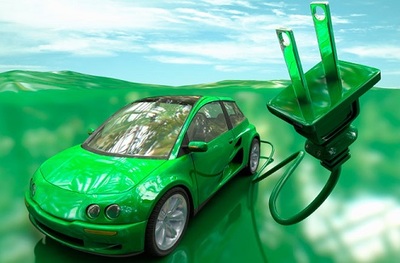Electric Vehicles: Automakers Moving Ahead Without Customers
• TACH's TAKE: China EV Monopoly Aided By Stupid US Politicians - U.S. States Pressure Automakers on EVs
Special To The Auto Channel
By Constance Douris VP
Lexington Institute
ARLINGTON, VA - July 10, 2018: In coming years, automakers will unveil dozens of new electric vehicle (EV) models. Ford alone recently announced that it is investing $11 billion in EV development. A glance at automakers’ EV investments worldwide is revealing: $19 billion in the United States, $21 billion in China, and $52 billion in Germany. Clearly, these seasoned companies do not doubt the future EV market as many cities and countries around the world begin phasing-out the conventional internal combustion engine.
It has been challenging, however, to educate and increase awareness of EV benefits to drivers. And as a result, automakers are currently ahead of the customer. Joe Eberhardt, President and Chief Executive Officer of Jaguar Land Rover North America, recently stated that automakers must “find a way to convince customers that there is a real benefit and advantage to having an electric vehicle.”
To motivate consumers to buy EVs and incentivize automakers to manufacture them, the U.S. provides up to a $7,500 tax credit, depending on battery size. The credit though is reduced after an automaker sells 200,000 units, including plug-in hybrids. GM is one company that expects to reach this cap before the end of this year.
While many people are aware that EVs benefit the environment, fewer realize that these cars, which are cheaper to maintain and operate than conventional cars, can actually help the electric grid operate more efficiently. EVs can flexibly charge and serve as a demand response mechanism by charging during off-peak times. They can also help incorporate more renewable energy and eventually export electricity back into the grid, even providing backup power during outages.
Many U.S. states and other countries recognize the benefits of EVs and have provided incentives for drivers. In California, for instance, EVs are eligible for Clean Air Vehicle Decals, which allow single occupants to access high occupancy lanes. Pacific Gas and Electric Company, Southern California Edison, and San Diego Gas & Electric all offer discounted rates for vehicle charging during off-peak hours.
In addition, California Governor Jerry Brown signed an executive order to decrease carbon emissions from cars and trucks and boost the number of zero-emission vehicles in the state. Governor Brown’s new target is five million such vehicles by 2030.
Texas has the AirCheck Texas Drive a Clean Machine program that provides a rebate up to $3,500 to replace a conventional vehicle with an EV, as long as some county and income requirements are met along with particular vehicle conditions. Austin Energy also provides reduced rates for off-peak charging with a one-time enrollment fee.
New York’s Drive Clean Rebate for Plug-in Electric Vehicles offers up to a $2,000 rebate for EVs. There is also a charger rebate program that provides up to a $5,000 credit for installation. Drivers with EVs can also access high occupancy lanes with a decal, incentivizing drivers with faster commute times. Consolidated Edison has a time-of-use rate plan for EV charging, while Cleanview Energy offers a $75 rebate for a new ChargePoint residential EV charger.
In Florida, Jacksonville Electric Authority gives a rebate of up to $1,000 after purchasing or leasing an EV. Drivers of EVs can access high occupancy vehicle lanes with a decal, and the car does not have to be tested for emissions. The Orlando Utilities Commission offers up to a $200 per charging station for businesses that install them.
The Trump Administration’s plan to soften the 2022–2025 federal fuel efficiency standards may create some risk for the EV industry. California and nearly a dozen other states, however, could still enforce existing emissions rules even if the standards are lowered. According to California Assembly member Phil Ting, who introduced a bill this year to ban gas powered cars by 2040:
With cars, California’s influence extends far beyond state lines. The largest car-buying market in the United States, California, has historically set air quality standards that surpass the Environmental Protection Agency’s. The state’s regulations also have a magnifying power, since more than a dozen states have adopted California’s rules as their own. Those rules are poised to remain in place regardless of any policy changes in Washington.
More effort needs to be made to educate drivers and increase public awareness about the advantages of EVs. There are also several resources for EV owners to easily find convenient charging stations to relieve concerns about being left stranded and unable to "charge up," such as ChargePoint’s dashboard. States should continue to support their fuel efficiency goals to prevent the industry from becoming unstable due to politics. And automakers must continue supporting efforts to educate the general public about EVs.
Constance Douris is Vice President of the Lexington Institute and manages the energy portfolio. She has published research and given speeches about Smart Grid data, cybersecurity of the electric power grid, and the impact of electric vehicles on the grid. You can follow her on Twitter @CVDouris.



